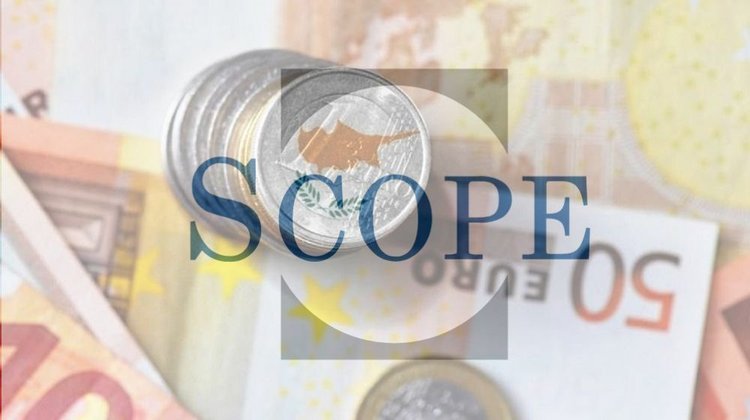Scope Ratings reports a Stable Outlook for the Cypriot economy in latest review
07:42 - 28 April 2025

Scope Ratings reported a Stable Outlook for the Cypriot economy in its monitoring review for the Republic of Cyprus, published on 25 April, reflecting the agency’s view that risks for the ratings are balanced, adding that the periodic review has resulted in no rating action.
As stated, Scope completed the monitoring review for the Republic of Cyprus (long-term local- and foreign-currency issuer and senior unsecured debt ratings: A-/Stable Outlook; short-term local- and foreign-currency issuer ratings: S-1/Stable Outlook) on 22 April 2025.
According to the rating agency, Cyprus’ credit ratings are supported by solid economic fundamentals and a strong growth potential with one of the highest growth rates in the euro area, a solid fiscal consolidation trajectory and commitment to structural reform and sustained improvements in the financial sector.
On the other hand, it is noted that Cyprus’ credit ratings are challenged by the small, open and externally dependent economy that is vulnerable to shocks due to the high dependence on foreign workers, oil imports and external demand; an external position characterised by large imbalances reflecting high import needs, moderate savings and high repatriation of profits by foreign-owned companies; and lingering albeit improving vulnerabilities in the banking sector, as reflected in still elevated non-performing exposures.
As per Scope’s review, real GDP growth is projected at 2.8% in 2025, down from 3.4% in 2024, while domestic demand is expected to be driven by a tight labour market, lower inflation, infrastructure investment, and further progress in the disbursement of the Recovery and Resilience Facility, following the third instalment (EUR 76.9m) paid in April 2025.
It is added that the moderation of commodity prices could also support domestic demand given Cyprus’ high dependence on oil imports, however, Cyprus’ small and open economy is vulnerable to escalating global trade tensions, which could reduce its services exports – particularly shipping, which accounts for around 7% of GDP. Although trade relations with the United States are modest and mainly focused on commercial services, Cyprus is highly exposed to the European Union, accounting for about 20% of exports and 60% of imports, it is further noted.
As per the agency, the fiscal surplus is expected to reach 3.3% of GDP in 2025, following 4.5% in 2024, and is projected to average 2.1% between 2026 and 2029, with last year’s strong fiscal performance having been driven by a record-high primary surplus of 5.8% of GDP as a result of strong revenue growth.
Furthermore, Scope refers to the Cypriot government’s commitment to maintaining a primary surplus and pursue prudent budgetary policies to contain net expenditure growth, adding that a tax reform, raising the corporate income tax from 12.5% to 15%, is expected to be implemented by end-2025.
It is added that strong revenue growth, long average debt maturity and limited financing needs are expected to continue driving solid fiscal performance, with the net interest payments anchored at 3.0% of revenue on average by 2029. Moreover, large primary surpluses and high liquidity buffers (more than 8% of GDP as of December-2024) support the government’s ability to withstand external headwinds and address structural challenges such as investment in energy infrastructure.
It is also noted that strong primary surpluses and robust growth prospects drive the projected decline in general government debt-to-GDP from 65.0% in 2024 to 58.8% in 2026 and 50.8% by 2027, representing one of the strongest performances compared to rating peers, with the debt trajectory being robust to a moderate economic slowdown and lower than projected fiscal surpluses. Cyprus is also expected to repay the principal on ESM loans (EUR 6.3bn) as scheduled from 2025 to 2031.
In terms of the upside scenarios for the long-term ratings are (individually or collectively), the agency identifies a significantly stronger macroeconomic stability due to, for example, economic diversification and lower external imbalances, enhancing resilience against external shocks, a significantly stronger financial sector outlook due to, for example, a resolution of the financial crisis legacy including a reduction of still high levels of non-performing loans, and further improvement in fiscal dynamics at a significantly faster rate than presently forecasted, driving an accelerated decline in general government debt.
As regards downside scenarios for the long-term ratings are (individually or collectively), it refers to a weaker fiscal outlook due to, for example, a loosening of the fiscal stance challenging the expected decline in general government debt, a weaker macroeconomic stability due to, for example, more pronounced external imbalances, undermining the shock absorption capacity, and a weaker financial sector outlook due to, for example, the resurgence of banking sector’s vulnerabilities.
(Source: CNA)

